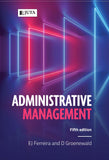
Pro-poor Legal Practice: Household Rights and Subsidised Housing in South Africa (2017)
Pro-poor Legal Practice: Household Rights and Subsidised Housing in South Africa
Authors
- Downie, L
About this Publication:
Since 1994 there has been a surge in private land ownership by low-income citizens in South Africa. Approximately a third of residential properties registered by the Deeds Office are previously State-subsidised houses. More than 12 500 000 people live in these homes, constituting a large base of individuals requiring legal services. Many of these new property owners live at the interface between the formal and informal economy. Standard property, succession and family law approaches are often ill-equipped to suitably address the many and distinctive (power) imbalances typical of this sector.
New legal strategies affordable to both lawyer and client need to be developed. This book discusses methods for developing pro-poor contracts and land tools for low-income clients. Prenuptial and cohabitation agreements, housing rights and land ownership are explored, since they are areas core to the sustainability of the private law.
Contents Include:
- Lawyer: Know yourself
- Enter the lawyer as scientist
- Pro-poor lawyers validate client norms
- Lawyers and plain language
- The lawyer and financial realism
- Legal aid
- Overview of chapters
- Know you are on a frontier
- Defining pro-poor terms
- The absence of legal aid for civil matters
- Inadequate formal conflict resolution platforms
- The urban land construct and tenure for the poor
- The effect of differing normative beliefs
- Informality and lawlessness
- Know your client
- Life story: Justice
- Poverty housing relief, marriage and tenure
- Hybridisation of marital culture
- Socially embedded norms and succession rights
- Categorising social issues for legal action
- Correlating social issues with client variables
- Sources used for social data
- Life story: Faith
- Correlating social issues with legal issues
- Legal framework: Marriage and cohabitation
- Traditional prenuptial agreements
- Sources of the formal law
- Formal legal frame for marriage and cohabitation
- Selected judicial precedents
- Legal framework: Subsidised housing law and policy
- Legislation
- Policy
- The public interest and good governance
- The big picture: Current land tenure thinking
- Recognising informal land tenure information
- Land tenure information systems
- The land rights continuum
- The social tenure domain model
- Pro-poor land tools
- The South African housing information system
- Access to information and enforcement mechanisms
- The Deeds Registries Amendment Bill
- Life story: Hope
- The state’s role in informal practices
- Strategies for pro-poor prenuptial agreements
- Prenuptial agreements as a tenure tool
- Differentiating pro-poor prenuptial agreements
- The use of conventional approaches
- Succession and dispute resolution
- Private ownership and use rights
- Protecting communitarian interests
- Personal servitudes: Usus, habitation and usufruct
- The initial stages of client interaction
- Law as process
- The use of legal templates
- The checklist stage
- The affidavit stage
- Example precedent A: Affidavit
- Discussion of the affidavit stage
- Developing clauses for a prenuptial agreement
- Taking instructions from the client
- Identification of existing template clauses
- Drafting strategies
- Drafting an usus agreement for subsidised housing
- Example precedent B: Usus agreement
- Drafting a succession agreement for heirs
- Example precedent C: Succession agreement
- Drafting a succession agreement for a trust
- Example precedent D: Mortis causa family trust
- Drafting dispute resolution clauses
- Example precedent E: Appropriate dispute resolution
- Drafting in anticipation of divorce or destitution
- Example precedent F: Family history annexure
- Comments on the templates and tenure security
- Further developing of the templates
- Simulating clients to test your precedents
- Simulating clients
- The Alphabeta couple
- The Kingwill case study facts
- The Kingwill case study re-storied as the Alphabeta family
- The Alphabeta family applications
- The Ubuntu family
- The Bhe case facts
- The Bhe facts re-storied as the Ubuntu family
- The Ubuntu family application
- The Familievas couples
- The Grootboom case facts
- The Grootboom facts re-storied as the Familievas families
- The Familievas families’ application
- Comments on client simulations
- Know that you don’t know
- Binding formality with informality
- Prenuptial agreements as a diversified land right
- Constitutional norms and marital land tenure
- Arguments in favour of the template approach
- Policy development and future research
- Conclusion
- Bibliography
- Books
- Articles and internet resources
- Legislation and bills
- Cases
- List of model precedents
Of Interest and Benefit to:
- Judges
- Magistrates
- Attorneys
- Students, researchers and academics
- Marriage officers
- International forums that follow land tenure
- Social workers and social scientists who deal with family conflicts
- Departments of housing
- NGOs that focus on gender, housing or land issues
We Also Recommend





